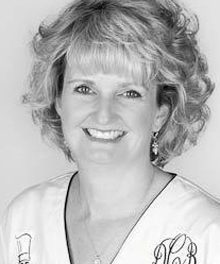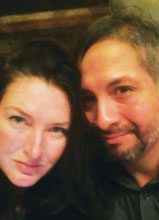 By Mindy Lucas
By Mindy Lucas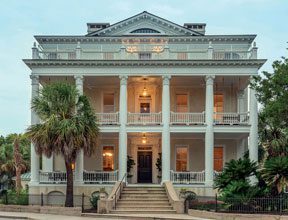
Executive Chef Daniel Salazar has been working in professional kitchen settings since he was 14 years old, when a colorful mentor first came into his life.
Originally from San Antonio, Texas, Salazar attended the Cordon Bleu in Scottsdale, Arizona, and has opened four kitchens, three in boutique hotels.
He and his wife, Misty Baker, now both work for the Anchorage Inn’s Ribaut Social Club – named for the original club established at the Anchorage in 1891 – and have since made Beaufort their home.
Lowcountry Weekly recently sat down with “Chef Dan” to talk about cooking, what inspires him, and new things in the works at the inn.
This interview has been edited for length.
Lowcountry Weekly: You recently made the move fromBoernein the Texas Hill Country to Beaufort, South Carolina. How much of a change was that for you and your wife, and are there differences in the type of cooking or cuisine you would find there?
Salazar: Through travelling there were a lot of things that I was familiar with,and there were a lot of things that I was surprised that weren’t here that I would have thought would have been here, ingredient wise.
The biggest difference is that yes,we came from the Texas Hill Country,and now we’re along the Atlantic coastline in South Carolina. What makes it interesting is that we kind of wanted to be in this situation orthis location. So I think that kind of made it feel a little more surreal, in that sense.
The cuisine obviously is different. Out here it’s more Lowcountry and inTexas it’s more Tex-Mex, that type of cuisine.
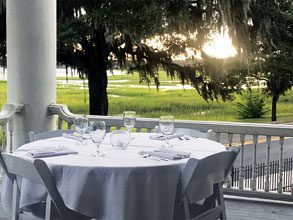 When I was in Boerne, I was working in a French restaurant and I was working in a steakhouse, so at that point it was just my training. I wasn’t in a chef’s position,but I was treated as a chef and I was paid as a chef.
When I was in Boerne, I was working in a French restaurant and I was working in a steakhouse, so at that point it was just my training. I wasn’t in a chef’s position,but I was treated as a chef and I was paid as a chef.
The cuisine I feel comfortable doing is obviously my own. I’m not a Southern chef or trying to say that I am. Just because I’m living in South Carolina doesn’t mean that I know what’s indigenous here. I’m learning that because I’m inspired by that, and I live out here now, but my whole cuisine has been French, Italian, global in that sense, but also local and farm-to-table.
So it wasn’t that different for me because I’m still doing my thing.
LW: Do you find the pace is different?
Salazar: It’s a lot slower.
LW: (laughing) It takes some getting used to right?
Salazar: It’s definitely the slow country.
LW: So you’ve been the head chef atAnchorage 1770 now for aboutsixmonths?
Salazar: Yes, six months.
LW: What sort of challenges did you first face, if any, and how have you worked toward meeting those or how have you brought your own style of management here?
Salazar: I’m very critical of myself. I’ve always been my worst enemy as far as criticism goes. Coming out here it was all very challenging, because you only have one opportunity to make a reputation and it takes years to do that.
So I wanted to be sure that I was doing things the right way… and I wanted to do something completely 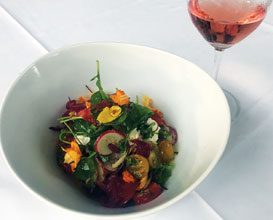 different here. I said, let’s elevate it.
different here. I said, let’s elevate it.
(The Anchorage) was always something that people locally said, ‘This is a special place that we go to’ and that’s great. There was a lot of support here prior to me coming here, but I also wanted to know what the reviews were.
I wanted to know what the staffing was like, what the setup was, what kind of ingredients were actually being brought in here. And once I actually laid everything out on the table, then I was able to say OK these are going to be some of the challenges here, because the kitchen space isn’t really equipped to be self-sufficient in terms of the direction I want to take it in.
Sothere wasa lot of tearing down, a lot of setting up anda lot of reorganizing to where Ifelt comfortable with that.
…One of the issues for me was the fact that people, including the staff, were used to a certain type of performance here. One of them was a bread service.The restaurants I have been part of, yes you have a bread service and yes you don’t have a bread service sometimes.
But it was one of those things where if you’re only having four people tonight and that’s it, I don’t really see a reason for saying, ‘Let’s fill them up on bread and then see if they want to split an entrée.’
So it was breaking down little barriers like that and kind of rebuilding it.
The menu changes every day. It’s always inspired by what’s at the market orwhat’s at the farm. Clearlyweather has a lot to do with that. So it doesn’t makesense to leave something and say this is it, this is the menu.
Also, discovering different types of purveyors out here, what they have and where they can get things from . . . I get a lot of my proteins flown in locally or within the U.S. at other farms or globally.
So that’s kind of the reputation I want to have here. You can have creative, local fresh salads and starters, but then when it comes time for the entrée, you’re going to have a big main event.
While we are talking, Frank Lesesne,who owns the Anchorage with his wife, Amy, steps in. Lesesneis excited to announce the Anchorage has purchased a 26-foot World Catand beginning this fall, the inn will offer sunset dinner cruisescatered bySalazar.
Salazar: So there’s a lot going on herethat we’d like to get out there.
Another thing is we’re goingto install a chef’s table. . . .We’re going to have temperature-controlled wine racks . . . and a big table that can seat about 12 to 16 people.
LW: And the concept behind a chef’s tableis for people to interact with the chef?
Salazar: Yes, it’s a table right where the kitchen is, so it’s kind of like a private dining area.
It’s going to be volume controlled, temperature controlled. Obviously you’ll have your privacy . . . so hopefully that attracts a lot of people who want to have that experience. And then of course putting out the food that we have or showcasing that, I think it goes hand in hand.
LW: And you said the menu would change daily?
Salazar: It changes pretty frequently. Daily is accurate. It can change between a few tweaks, or it can change completely. . . Again it’s based on what is fresh, what’s available and that’s something that I want people to know is that they’re not going to have something that’s a week old, or not inspired.
I have realized there are some favorites that people have as far as proteins go. So I’ll keep those,and I’ll 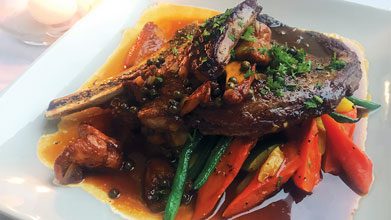 rotate them, but I’ll do different plates on them and then go back to what it was before so that it’s unique in that sense.
rotate them, but I’ll do different plates on them and then go back to what it was before so that it’s unique in that sense.
But I have a vast array of different types ofchoices on there that kind of make the menu look bigger at the same time. So for instance, tonight I’ll have USDA prime bone-in ribeye with foie gras, and I have a sablefish which is black cod, and I have a Blue Ridge Mountain troutthat I smoked.
I’ll do rack of lamb, I’ll do wild boar chops orpork crown. I’ve evendone different types ofgame. Bison sells a lot here. Wagyu beef, from Miyazaki, Japan, which I sold out of in two days. Those are $120, six-ounce steaks.I had the certificate, which the servers took to the table to prove their authenticity.
People just eat it up. I had ostrich, rabbit. So we’re calling all the foodies here. People who are like, ‘Oh man, I’ve never had this before,but I trust the execution here,so I’m going to try it here.’
I think that’s pretty exciting, especially if you’re going to rotate the menu to keep it on things that people are going to be interested in, especially the foodies.
LW: How did you first become interested in food and cooking?
Salazar: It’s not the same story that most people haveabout theirgrandmaor my mom. It wasn’t either of those peoplefor me.
I was going on 15 and near my high school there was a restaurant. . . This is in San Angeloin West Texas. I’d go to the grocery store with my mom, and I’d see this big guy with a ponytail, he’s German – Austrian. Scruffy. T-shirt. Baggy, chef pants.
And I was like who is this person? And people at the store were very kind and friendly to him, and I was very intrigued by this and thought what’s going on with this?
. . . Then at night we’d drive by the restaurant, and I’d see these nice cars out there and people very well dressed,and I’d see the chef out there drinking a beer having a good time,andI was just so captivated by that.
I was like, ‘What kind of job is this?What does this guy do? ’It’s like he’s hosting these individuals, but he’s not like them. He’s still his own person. There was some connection there.
So one day, after school I went into the kitchen,which,it was a house that was renovated. It was built in the early 1920sand . . . it was an old building that had been renovated into a house and then renovated into a restaurant,so when I went in through the back door it was like a carport area, but that’s where the kitchen was.
So I’m there, and all of a sudden I hear these big foot steps coming down the dining room hallway, and the door swings open, and there’s this guy standing over me,and he’s freaking out on me.
He says, ‘What are you doing? Are you a thief?’
I didn’t even know what to say. I froze. Finally I was able to talkand I said, ‘I’m just curious about what you do? ’I think that’s what I said.
So after he made sure I wasn’t stealing from him or anything, he put me to the test. Jason, the kind of test he would give someone would be like, are you just someone who is full of words or are you full of actions.
LW: What was his name?
Salazar: Jason Helfer.
So everyday before and after school, I would be there in the kitchen ready to do whatever – cap strawberries or whatever.
I have a hearing loss in my left ear. I was born with that. I didn’t know how to handle that. I didn’t know how to address that. It made me feel very self-conscious, and I always sacrificed my learningso I didn’t feel like I was hindering someone else’s ability to learn.
I kind of had those issues as a kid but being there in the kitchen and being with Jason, it really helped me – instilled confidence and helped me get over that.
LW: That’s a great story.
Salazar: So after about two months, he said, ‘Hey, I can’t pay you a lot of money, but you’ve been consistent. How would you like to be a pot washer?’
I jumped all over that. I thought it was the best thing in the world. Unfortunately, you don’t see a lot of ambition like that nowadays.
LW: Right? And you were still in high school too.What did your family think of this?
Salazar: My family always told me that everything you want, you have to work for it. So when I started showing that I was good at something,and not only was I good at it but I respected andtook it seriously, it became something that wasvery positive,as far as my parents were concerned.
When I graduated high school, Jason said, ‘The best advice I can give you is to wait and work a few years before you go to culinary school just so you’ll know what kind of student you’ll be, what kind of questions you’ll ask and what you’re interested in doing there.’
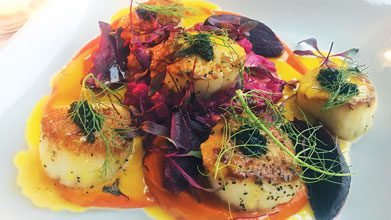 And so I did. I went and worked for the Marriott in San Antonio – the Marriott Rivercenter. That was my first major experience. It was just a huge kitchenor kitchens; it wasn’t just one. And then from there they started training me andbuilding me up to go to school.
And so I did. I went and worked for the Marriott in San Antonio – the Marriott Rivercenter. That was my first major experience. It was just a huge kitchenor kitchens; it wasn’t just one. And then from there they started training me andbuilding me up to go to school.
So I went to school from there and then the executive sous chef there, at the Marriott, recommended me to a friend of his who was opening a Marriott Hotel in Cleveland. So I quickly went and did that.
LW: Did you keep in touch with Jason? Does he know what an influence he had on your life?
Salazar: Oh he introduced me to my wife.
LW: What?! You’re kidding.
Salazar: This is like 21 year years ago, but Jason made mecry. He was a bastard you know. (laughing)
LW: (laughing) So he was tough?
Salazar: But very fair. And I learned to respect that about people.
You have these talking heads and these people who just get mad all the time for no reason, but I’ve worked for chefs before who were that way, but you didn’t mind it because of what they showed you and how they would take care of you.
LW: They pushed you to be better than maybe you thought you could be?
Salazar: Yeah, they were positive in that way.
After I opened up a hotel in College Station (Texas), my contract ran out,and they asked if I wanted to renew the contract. I didn’t really see myself being in College Station. It just wasn’t for me.
So I was trying to figure out what I wanted to do, so I thought, well,I’m back in (San Angelo) Texas now, let me reach out and see what Jason is doing.
So I reached out – I hadn’t spoken to him in like 20 years. He was just beyond impressed with what I had done with my life and everything.
He went to Johnson & Walesin Charleston,so that was his stomping grounds. So he said, ‘I have this restaurant. You want to be a special guest chef?’
He was newly engaged and said, ‘Now that you’re here, I feel like you could run the restaurant for the week, and I’m going to go with my wife-to-be, and we’re going to take a trip with her parents.’
So I was like, ‘Yeah, I’ll run the restaurant.’And when he came back, he said, ‘This is great. Great feedback, great reviews,it was busy, we made some good money and the menu looked great.’
So he said, ‘Let me take you out.’
So we went out, and we had some Scotches and Bourbons and all that and it was a completely different relationship now. And then we ordered some Japanese food and when we went to go and pick it up, Misty was there with her restaurant owners who were friends with Jason because they owned a restaurant in town as well,and so Jason introduced me to them and he saw Misty and he was like, ‘I’m going to do Daniel a solid here.’
So he kind of paired us up, and said, ‘Let’s go back and have some more cocktails’ and as soon as we got there, he said,‘Oh,I gotta go’ and he left us there.…So that was like two-and-half years ago now.
LW: (laughing) I think you got a lot out of that deal.
Salazar: He really said thank you for running my restaurant for a week. I mean it’s cool how he was a big part of my life then and he stayed in contact.
One of the things he made me promise when I got out of high school and before I left town was, that if someone ever came to me and wantedto learn,I woulddo what he did for me.
And I’ve been able to do that. I’ve turneddishwasher cooks. . . that are now junior sous chefs and everything. It’s very gratifying in that sense.
LW: And your wife has that background too?
Salazar: She is the manager here. She’s actually a sommelier. She has over 20 years in general manager experience. She’s very sharp when it comes to beverage and all that and they love her here. She’ll bake cakes . . . she does a lot.
LW: What do you like about Beaufort or what do you and your wife like to do when you have a day or two off from the inn?
Salazar: We love Bluffton. Bluffton is a cool town. We’ll go over there and check out different restaurants and little spots, little shopping areas.
We’ve made some pretty good friends here so we kind of hang out with them. We have a beautiful house in Pigeon Point, so a lot of house work. We’re sort of homebodies in a way.
Tuesdays I’ll sometimes go to Hampton and go to the farm that we use here, visit out there with them, check out what they’re doing. We just kind of take things a little easy and kind of let that slow-country rhythm come in.
What we’d like to do is, but of course we’re very limited because of the whole Covid thing, but we’d like to get more involved. I’d love to start an American Culinary Federation (ACF) chapter in Beaufort. . . . Another one is the South Carolina Chef Ambassador Program. There’s a lot of cool things that I’d liketo do, but we’re on stand by as far as that goes.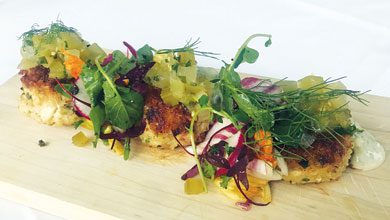
But when Covid hit and a lot of these places started closing down, that’s when we decided to do a pop-up Italian restaurant here. . . with handmade pastas and everything. And people were flipping out.
The owners told me they were in Atlanta and they started having a conversation with someone and they said the Chicken Piccata there (at The Anchorage) is amazing. And in Atlanta they’re saying that. So that’s cool that people responded that well.
I think another major identity that we have here is that we can do whatever we want. So it’s not like, ‘Oh this is seafood,’ or ‘This is thisor that or this kind of theme.’ We can adjust to whatever environment or situation we’re in.
. . . We have a lot of weddings coming up here this fall. And that’s something I always try to sell them on that it’s not likeyour typical, ‘Oh I’ll have the chicken and you have the beef’ kind of catering.
It’s different kind of composition stations on each floor . . . and to me that’s cool because a lot of my experience is not just from restaurants, but it’s also from catering, so that’s great that we can do all that.
LW: Is there anything I should have asked that’s important for readers to know.
Salazar: I think something that’s important, or one thing I want to stress, is how appreciative I am to the community, so I want to open by just saying thank you.
Thank you for taking an interest in my life, as well as Misty’s life and who she is as a person. I’m glad that we’re local and small enough to where people can identify who people are, and I appreciate that.
And I appreciate people supporting us during lockdown when we were doing the takeaways.
And, I want people to be excited that this is a special place.
If You Go
For more information or reservations to the Ribaut Social Club at Anchorage 1770, call (877) 951-1770 or visit www.anchorage1770.com.

